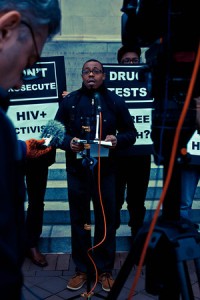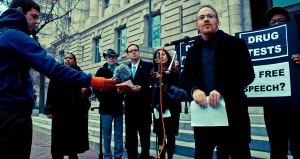
AIDS activist Antonio Davis may may get six months behind bars for an act of civil disobedience. Photo by Larry Bryant
Listen to Matthew Kavanagh and Antonio Davis on TheFightBack on We Act Radio:
Audio clip: Adobe Flash Player (version 9 or above) is required to play this audio clip. Download the latest version here. You also need to have JavaScript enabled in your browser.
Last year, D.C. Mayor Vincent Gray went to jail when he and forty others committed an act of civil disobedience outside the U.S. Capitol in order to highlight the District of Columbia’s inability to spend its own tax dollars as it chooses.
Also on that day, April 11, a dozen activists were arrested outside the office of House Majority Leader Eric Cantor, who proposed cuts to HIV/AIDS funding, as well as to the District’s needle exchange program.
The group which included Mayor Gray and six sitting D.C. councilmembers received light sentences, mostly amounting to no more than $50 fines. The HIV/AIDS activists, however, are facing more serious charges.
While the mayor’s group was prosecuted by the D.C. Attorney General, the AIDS activists have had their cases handled by the U.S. Attorney’s Office.
“It’s deeply disturbing to see the U.S. attorney cracking down on nonviolent, non-destructive civil disobedience actions,” said Matthew Kavanagh, an AIDS activist who works with DC Fights Back and Health GAP, and was one of those arrested outside Cantor’s office. “It’s incredibly out of proportion,” he told TheFightBackon We Act Radio.
AIDS activist Antonio Davis is facing the possibility of six months behind bars for his participation in the April 11 demonstration after he failed a subsequent drug test required by the U.S. Attorney’s Office. Davis, who works with ACT UP Philadelphia, says he had good reason for failing the test.
In order to alleviate his pain and improve his appetite, Davis, who’s HIV-positive with an AIDS diagnosis, has been prescribed medical marijuana by his doctor, which is legal under D.C. law. If convicted, Davis may lose his paralegal license and his adoption process may be hindered, he said.
Speaking alongside Davis and Kavanagh at a press conference outside the John A. Wilson Building last week, Charles King, Housing Works president, said, “I want to promise the U.S. Attorney that this aggressive prosecution, this persecution of AIDS activists is not going to deter us.”
“Anybody who knows anything about the history of the AIDS epidemic knows that every single progressive policy… has happened because people were willing to take to the streets, because people were willing to engage in sit-ins,” said King.
In July, thousands of AIDS activists and researchers will gather for the International AIDS Conference here in D.C., where HIV/AIDS remains a generalized epidemic. King pledged to keep the U.S. attorney “very busy.”

